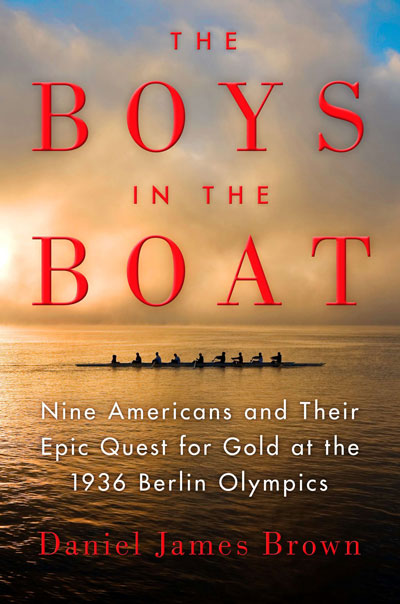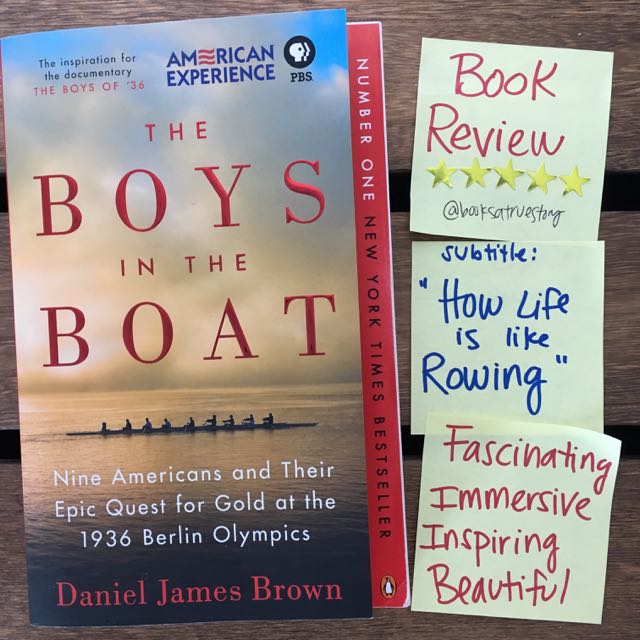
The Boys in the Boat: Nine Americans and Their Epic Quest for Gold at the 1936 Berlin Olympics
by Daniel James Brown
Published: June 4th 2013
(416 pages)
moreFor readers of Laura Hillenbrand's Seabiscuit and Unbroken, the dramatic story of the American rowing team that stunned the world at Hitler's 1936 Berlin Olympics
Daniel James Brown’s robust book tells the story of the University of Washington’s 1936 eight-oar crew and their epic quest fo...
The subtitle for The Boys in the Boat should be “How Life is Like Rowing.” Each chapter starts with a beautiful and inspiring quote from George Yeoman Pocock. The quotes are about rowing but George is such a deep and thoughtful person that to him, everything you learn in rowing can be applied to life. This is my favorite quote from him:
It is hard to make that boat go as fast as you want to. The enemy, of course, is resistance of the water, as you have to displace the amount of water equal to the weight of men and equipment, but that very water is what supports you and that very enemy is your friend. So is life: the very problems you must overcome also support you and make you stronger in overcoming them.
-George Yeoman Pocock, quoted in The Boys in the Boat by Daniel James Brown (pg 53)
The Boys in the Boat is narrative nonfiction. Tons of research from newspapers and other sources made the story feel immersive to the point that he often described the weather for a story that happened over 80 years ago. I enjoyed the detail, but it probably erred on the side of too much since it was a little dense to get through. I think it could have flowed better if it had studiously left some details out.
The story loosely follows Joe Rantz whose life illustrates the hardships of the 20’s and 30’s in the rural Western United States. Even though I’ve read tons of stories about the Great Depression before, seeing how it affected Joe’s life still shocked me. I definitely take for granted what it was like to survive back then. Joe was abandoned by his family at a very young age in the middle of the depression, yet he was full of optimism and work ethic. The best example of this was his attitude to finding four-leaf clovers. “The only time you don’t find a four-leaf clover is when you stop looking for one. (pg 69)” And he almost always found one.
I learned so much about rowing. The physical demands of the sport are insane. Rowing one race is like playing two basketball games back to back but in 6 minutes. And their muscles are screaming with pain the entire time. I will never watch rowing in the Olympics the same way again.
When Daniel James Brown narrated the races, I’m 100% sure that it was more intense, exciting, and interesting than watching the actual race. Each race was translated into non-sports language about why we should care, what strain their bodies must be going through, the strategies the teams were probably using, and the challenges they had to overcome to win. It was completely fascinating. He also did a wonderful job of highlighting the beauty of the sport that I had never noticed before. “A symphony of swinging blades. (pg 249)” It really is a beautiful sport in so many ways. I’m glad I read The Boys in the Boat and learned a little more history and gained appreciation for a sport I had barely given a thought to.
Book Review of The Boys in the Boat on a Post-it
I post reviews like this on Instagram. Be sure to follow me there!

** Read my book to movie comparison about the PBS documentary made from Boys in the Boat.









 My name is Jessica. I love to read Young Adult and classic literature. I’ve been a book blogger for six years and I haven’t gotten tired of it yet. I’m a very curious reader. Writing about all the questions and thoughts I had while reading a book is the best hobby ever.
My name is Jessica. I love to read Young Adult and classic literature. I’ve been a book blogger for six years and I haven’t gotten tired of it yet. I’m a very curious reader. Writing about all the questions and thoughts I had while reading a book is the best hobby ever.
Sounds like an incredible read. Too bad about the over abundance of details.